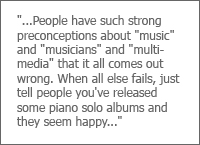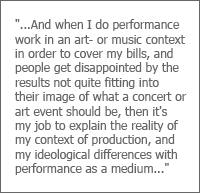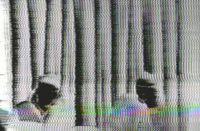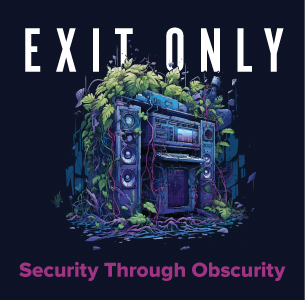
(01.11.06) COMPOSER/ARTIST Terre Thaemlitz is crossing wires/genders, once again in a new epic chapter in an ongoing digital dialogue, called Trans-Sister Radio on the Portugese Grain of Sound imprint. Sound meets voice meets the impersonal vs. social engine that drives gender awareness internationally through the ambiguous tension of terrorism, travel and language. In between things we had the chance to catch up… albeit intercontinentally:
TJ Norris :: Greetings and thanks for taking some time out to chat! It’s been a while. I hope the Winter Solstice finds you well, and creatively stimulated.
Terre Thaemlitz :: Yes, it’s been a while! I’m doing pretty good, thanks… but who cares about creativity? Ha, ha.
TJN :: Aha. I do. Well, at first glance I must say this new Trans-Sister Radio thang looks pretty neat in concept! It’s pretty deep shit. I mean, the thought of observing how gender can potentially associate within (and outside of) the law is fascinating.
TT :: Gender is definitely legislated. “Gender Identity Disorder” or not, it’s not a matter of observing a merely “potential association.” But for most people, the ways in which gender is legislated is so deeply internalized that it’s easy to think and talk as though the two-gender system is natural. From the doctors who insist upon gender-assigning inter-sex infants, to women being consistently paid significantly less than men for the same work, the ways in which these systems condition and violate us are unending. And there is always the hypocrisy between what is “illegal” yet “totally acceptable” (such as in the case of wage gauging). I guess for me, the saddest thing is that gender still fails to register as a personal issue for most men. That totally sucks. It’s unforgivable.
Am I being grumpy? I’m getting more impatient as life goes on, sorry, ha ha!
TJN :: I think you are more than simply justified here. Especially given your keen interviewing of officials at airports on this new recording. I really enjoyed the tension in the simple direct questions you asked and the “see no evil” responses given. But creatively how has this new project developed as part a series: Insterstices, G.R.R.L. and Couture Cosmetique?
TT :: It does contain a few bits from Insterstices, Means from an End and A-Muzak, but it’s not really a series… just touching on recurrent themes around gaps between identities and bodies. I guess we should mention, this project was originally developed as a “radio drama” for the German broadcaster Hessischer Rundfunk, so I don’t really consider it to be of the same order as my other “music albums.” Obviously there is a lot more talking, and trying to get ideas across in the one-pass listening format of radio, although I personally put in stuff that I think only comes across after a few listenings. People said it stood up to multiple listenings, which is why I felt comfortable with the idea of a CD release. Even just as a document, maybe the parts about transgendered travel and passport control are valuable to some people – not in terms of providing answers, but simply existing as a reference – there is really so little shared information about that within transgendered communities.
TJN :: I would imagine so. But it’s an interesting way to package it nonetheless. To the point with a slight intellectual cheekiness. Radio, one of the oldest forms of mass communication. What has it become in Y2K+?
TT :: I don’t even own a radio. I hate radio. So I’m not sure what radio has become, other than the total shit I hear at Japanese shopping malls or whatever. Recently, it seems most media (thinking of the US) is geared toward a fiction of “acceptance.” Even in queer communities, people act surprised when someone talks about experiencing bashing or violence, but I’m just wondering what the fuck planet they are living on! I call it the “Will & Grace factor” – if we see it on TV, we believe we are accepted and can more easily overlook the discriminations we face in reality, dismissing them as random and rare. If you are ever in doubt, cross dress the next time you go to the supermarket or some other “daily life” location, and watch for reactions. In term of radio, I strongly believe the whole Hip-Hoppification of pop culture is total bullshit propaganda that conceals the racial and social disharmony of the US. I don’t mean that as a “conspiracy theory” – I mean it as a social practice the media industry and public participates in and propagates, consciously and unconsciously.
TJN :: Amen Sister! Couldn’t have put it down on paper better myself. Well, how about having no-commercial potential then…fine artists find this more often than do performers. Speaking of – do you still find time to draw? And can you talk about your visual compositions, how you take something visual, on paper, and turn it into something layered to listen to?
TT :: Sometimes! This past year I put in a new graphic design section on my web site, which includes illustrations and photography – not only stuff from packaging designs, but also non-commercial stuff. (View it here)

TJN :: I had no idea that you did those cool illustrations for your alter-ego DJ Sprinkles! What are you doing next…any performances, recordings, special projects?
TT :: I have a big release coming out on Comatonse Recordings in March 2006 – K-S.H.E (Kami-Sakunobe House Explosion) Routes Not Roots. It’s “big” for me in terms of self-production and manufacturing – a CD album plus three 12-inch vinyl EP’s (View releases page), doing all the design work myself, etc. It’s stylistically along the lines of Fagjazz and other dance-oriented Comatonse releases, influenced by the atmosphere of my bimonthly Tokyo event “Deeperama.”
As a DJ I’m always critical of the way dance music appeals to essentialist notions of “roots,” or a kind of authenticity within various dance cultures, which I think is bullshit. Everything changes with time and context (like my DJ-ing NY house music from the peak of 80s HIV/AIDS activism almost twenty years later in Japanese or European events where the people listen more and cherish the music more than in the past, despite not knowing its history – it conjures mixed emotions in me). All that “roots” stuff becomes a kind of romantic nationalism within the “House Nation.” House is trapped in a kind of terminal nostalgia for the late 80s and early 90s – even the same fucking big-name DJs still dominate NY clubs, keeping everyone else out. The talk about the wonderful heyday of NY house culture is a nonsensical fiction which ignores the turmoil that music emerged from – that music was about a deliberately escapist formula, a place for people to unwind, but the escapist ideology is all that has remained. K-S.H.E is about the disharmony of club culture – not the meaningless rhetoric of “love and understanding” which is simply a denial of the economic and social realities of most people in the clubs. So the tracks take these contexts of history and location into consideration, with themes like personal identity vs. immigrant status; community vs. tranny-on-tranny violence; authenticity vs. cultural decontextualization; openly gay African-American club imagery vs. gay sex on the down-low; HIV drug trials, lack of employment opportunities for trannies and women, etc.
Uh… but I swear, it’s sexy and danceable! Ha, ha! (Really, it is…)
TJN :: I’ll believe you with my ears tied behind my back. I enjoy your reticence to just fall victim to something as abstract as dance cultures, its so transparent to me.
Your sound, since I first heard your work, well, it was quite ambient (as heard on Soil and Tranquilizer) though you have developed something I might refer to as proto-electro sound diagrams, with intermittent melodies and puns aplenty. They are like documents, snapshots, memories. How would you describe your ouvre?
TT :: Generally, I guess I would say “cross-media electroacoustic and computer synthesis”? It’s hard, like at a dinner party or something, when people ask what I do. People have such strong preconceptions about “music” and “musicians” and “multi-media” that it all comes out wrong. When all else fails, just tell people you’ve released some piano solo albums and they seem happy.
TJN :: Party people in the haus say HELL YEAH! “They” will never get it. Let them eat jellybeans!
In some way you are a pioneer for transgendered people in music, as it directly plays on the inner and outer confrontational (and rebel) aspects of its anti-social realities. How trans folks live alongside the fine-line of how typical media can portray a twist of spoof, poof and circumstance. The whole issue of dealing with your gender, a passport, in an airport, during our times, is one of those Cartier-Bresson “perfect moments” as far as I’m concerned. A jaw dropper, reverse super-imposition of gender. I mean, transgendered people are dealing with complex psychologies, drag is temporary. Care to share?
TT :: I guess in my mind, the anti-social aspects of gender identity come from the violence of conformity, not the “anti-sociality” of someone like myself. The things I produce are not about rebellion, but simply trying to find ways to escape that violence. Not “escape” in terms of “escapism,” but simply dodging blows and running to some kind of momentary safe house – in my case, the safety of creating these fictions through which I try to rationalize and understand the things happening in my life, and the lives I see around me.
TJN :: The marginalized angst, the darker side, is there. It’s more a dialogue than a diatribe. The work speaks in multi-tones, and is collaged to a degree that those with open ears will piece together something quite clever, those unsuspecting may get an earful of obscurity that begs to be challenged to some degree. On some level I kind of jumped a lil’ when I saw the genitals replacing the headshot in the passport cover design. Is that you?
TT :: …Disappointed? Ha, ha.
TJN :: No, no, au contraire. Passports are fun to play with, all the places you can go, and it’s like a paper tattoo!
TT :: The “Is that you?” question about genital authentication is precisely what “Trans-Sister Radio” is trying to get away from, although the CD design does beg the question to be asked all the more, ha ha!
TJN :: As far as “pass control” is concerned, when you walk through airports what has your personal experience as Terre been like? How about as Miss Take?
TT :: Even dressed as a boy, men with long hair are more frequently stopped by security. We haven’t even socially gotten to that point of accepting men with long hair. It’s amazing. I was recently stopped in Barcelona, and as I described in the Trans-Sister Radio project, the guard tried to treat my women’s clothes as undeclared taxable goods, rather than my own personal items. Then I had to have an unwanted conversation trying to explain they were mine, wondering if that would raise other suspicions about me that might affect my entering a country, etc. On the bright side, it’s always nice to know these little paranoid games I spin in my head are rooted in reality, ha ha. The world is pretty good about delivering on all of my personal fears and worries. No disappointments in that sense.
TJN :: Ain’t that the truth, and nothing but it. Don’t hate me for saying, but my pet drag name for myself has always been “Miss Anne Thrope.” I guess it sorta describes me in many ways, and when it comes to my more empathic, feminine side, she purrs inside me with or without any physical manifestation.
TT :: (Smile)
TJN :: It’s weirdly empowering for me, the weird part is secret. What is the difference between the two Lovebomb‘s (Mille Plateaux) and the version you released on Comatonse?
TT :: The Comatonse release is a DVD of the complete original video by myself, plus bonus videos by Caspar Stracke. It also includes a second audio CD of the complete album, and some insert photographs. I’m really glad to finally have it out, especially since I was never paid for the Mille Plateaux release – that was a Lovebomb in itself.
TJN :: Seems Mille Plateaux vanished, poof! Speaking of labels, you worked with some small French house lately on something I heard about, a project with Japanese artist Haco based on new wave. Can you say anything about that recording?
TT :: Our “band” is called Yesterday’s Heroes, and the album title is 1979. It was released on the tiny French bedroom label La Louche. Haco has always been a heroine of mine, since the ’80s, particularly for the rather un-advertised Feminist content of her work. The tracks on this album were all produced in various styles of New Wave and Techno-Pop from the ’80s – kind of like my album G.R.R.L. where each track is in a bit of a different genre. It’s definitely atypical for Haco and myself – maybe as close to a Pop album as I could ever come, and nothing to do with her 80s work with After Dinner (I hear some of her fans were upset by this album). The main point about this album was that, unlike the ’80s revivalist stuff that tried to make ’80s music cool, Haco and I really feel that kind of music only had appeal because it was for outcasts and losers. So we didn’t try to spiffy things up, or make it “cool” in any way. The photographs were all montages from actual photos of Haco and I during the ’80s, so I had fun doing those too.
TJN :: What is it like running your own label, Comatonse?
TT :: Well, Comatonse Recordings has never been a proper label with an actual release schedule or formal distribution. After twelve years it’s still an out-of-pocket thing. Sales are nothing, so in that sense I am able to do everything myself, ha ha! Of course I do all the design work, website, packing and shipping orders, everything.
I prefer playing the “producer” role and simply licensing my work, such as I did with Mille Plateaux for many years, or having “Trans-Sister Radio” come out on Grain of Sound and Base Recordings. When it comes to electroacoustic music and the European audience, they can do more with it than I can. The only distribution Comatonse has is with Japanese house music distributors – mostly Cisco, and also a few releases through Manhattan. The plus side is that they are vinyl-heavy and I get to design album jackets, etc. The down side is that the music has to always have a kind of house component to it. I enjoy making the dance stuff, but if a distributor doesn’t pick it up with a pre-order, I don’t really have the money to press records, and the project will get tabled.
TJN :: Yikes. That’s the edge.
TT :: But even for the limited editions with no distribution, such as the Comatonse tenth anniversary compilation Below Code, I still try to make a nice “object” – the packaging on that was really fun to design. (CD copies are gone, but people can download the complete compilation from the website for free.) Still, it makes no sense to pay all the set-up fees and press a thousand copies of something when I have no distribution for it. So that’s why I also like to make small-run things like the “Lovebomb” video set, which uses DVD-R and CDR. I still have them professionally manufactured – it’s much more reliable than burning discs yourself – but they are limited runs, and I think the packages have a more home-made feel. I like making things that reflect all the different ranges of economic possibility affecting my projects. It’s also how I collect old records or books – the most interesting things to me are the weird items that make you wonder why they were made like they were.
TJN :: Oh, that is totally refreshing. I love the object, and even find myself, excuse me for embarrassingly saying, flipping through Martha Stewart Living if it’s lying around somewhere. The physical/personal touch, things that are hand numbered in small intimate editions, the hand/homemade aspects of small-run projects. I used to dig some of those old Zoviet France covers, until I listened to it and then absolutely fell in love!

TT :: I hope Comatonse also has that kind of image – maybe a kind of “unreliable” image, working in different genres, different media, different distribution territories (like the dance stuff rarely leaves Japan and the electroacoustic stuff rarely enters Japan) – it’s playing with that tension of “Should I buy it? That last album wasn’t at all what I expected.” I admit, it’s not a good sales strategy, ha, ha! But I like that different people can have “Terre Thaemlitz” collections which are completely unlike someone else’s “Terre Thaemlitz” collection – never complete, and the complete collection isn’t even necessarily desirable. It’s a way to get away from the typical corporate model of an “artist” producing a single body of work, and make the releases less about me and more about a certain context of production or period in time.
TJN :: Rebel-rebel.
TT :: I want to eventually re-issue all of my old CD releases on Comatonse, but with so many titles and no distribution I really have no space to store five hundred or a thousand copies of each, so I’m currently trying to figure out a good small-run design strategy. At the same time, the upcoming K-S.H.E album is a full-run CD with special packaging, poster, sleeve, etc. So I guess running Comatonse is like everything else I do – kind of deliberately all over the place.
TJN :: That’s a great phrase..”deliberately all over the place”. Very “Koyaanisqatsi” of you! You have released several platters as DJ Sprinkles and other special mixes on Comatonse. Will you ever consider releasing a mix compilation on CD for us (ducking down) vinyl-phobics?
TT :: No need to duck! Vinyl is fun to design, but difficult to master the audio for. It would make absolutely no sense to release an album like Lovebomb on vinyl. There is the DJ Sprinkles Mix CDR series, which is an affordable CD-media based option for people to hear mixes recorded live at my “Deeperama” events. The mixes usually include some of my own tracks, as well as private remixes of records by others that I re-edited for my own DJ needs. There’s also the Fagjazz double CD compilation from a few years ago, which includes tracks from almost every vinyl, plus CD only materials. G.R.R.L. was a CD-only release. And the upcoming K-S.H.E CD is a full 80-minutes containing things not available on the vinyl EP’s, either due to vinyl time limitations or sound limitations. I guess my little label’s heavy-vinyl image keeps a lot of people from realizing what’s available on CD – it’s not just you.
TJN :: You are still teaching?
TT :: I think you’re referring to the “Very Fucking English Lesson” cultural workshops I did here in Tokyo?
TJN :: (explosion of laughter)
TT :: Those stopped a few years ago, but people in Japan still call me “Teriko Sensei” (“Professor Teriko”). I was never a “teacher” – it was a performance series ridiculing the tendency of foreigners with no teaching qualifications to come to Japan and work as English teachers (a world I really deliberately stay away from). Typically, politics and sexuality are taboo subjects in those English lessons, so my workshops used the English lesson format to focus on social- and identity issues. (The workbooks I developed for this series are all online at comatonse.com.) The point was not to have people talk in English, but to get people thinking and talking about various cultural issues in Japanese, and think about how Western perspectives on identity and the like can and cannot function in Japan – such as the “lesson” on Feminism focusing on why Feminism has failed in Japan as a result of cultural and economic shifts, identifying Japanese concerns around gender inequality, and if Western Feminist strategies do not assist in expressing those concerns what strategies could be employed in Japan? That sort of thing.
TJN :: OK, I can see the disconnect to some extent, then why did you decide to land and stay in Japan?
TT :: Well, there’s no simple single answer, but the main reason I wish to continue living in Japan is the safety. Nobody fucks with you in daily life. I’ve never felt physically threatened. My life in the US was so plagued with the stress of harassment that when I moved here five years ago, at age 32, adjusting to the safety was actually a kind of shock to my system.
It’s not a question of Japan being more “open” than the US around gender issues. Conditions for women here are dreadful, and options for how men can live their lives are also near zero. Still, you cannot think of it in general terms of “better or worse.” It’s different. And a big part of that difference is not that bias doesn’t exist, but it is expressed in different ways. Regarding transgendered people, in less violent ways. In the US, if people don’t like you they let you know about it. They yell, spit, punch, whatever. In Japan, they ice you out and ignore you. Coming from the US, that silence is golden. For my transgendered friends born and raised in Japan, the silence and isolation is a horrible burden. And I have no doubt that were I born in Japan I would fucking hate it. It’s all about context and personal history.
TJN :: In some mystic, distorted way that’s harrowingly poetic. Perception in and of itself, is the deepest fear for some. But just as when I was in high school and my best friend was transgendered, I remember the burden, the secrets, the personal dissonance. It was horrifying silence for her. It was hard to watch, especially as it downward-spiraled into drug abuse and HIV. Though I took the role of “protector” to some degree. It actually gave me an outlet to truly test my masculinity, as that was absent at home.
TT :: I’ve also been really fortunate to keep out of “foreigner circles.” That’s another real social trap, the foreigner lifestyle. It also affects work – for example, there are promoters who specifically work with “foreigners” in certain clubs for our “cool factor,” and they have a certain attitude (patronizing, always speaking in English in a way that is not so much about being friendly as reinforcing my status as an outsider, etc.).
TJN :: That kind of cultural ignorance is always disheartening.
TT :: And that kind of work context really reinforces the notion that “foreigners” are always “temporary” in Japan, and lacks any concept of immigration. It’s a real struggle to immigrate here, not only in legal terms but social terms. You can live here 20 years, but if you are physically not Japanese they will still treat you like a tourist… and part of that is because living in foreigner circles keeps many of us “tourists,” limits language skills, etc. And the various immigrant communities are also pitted against each other in terms of class, job access, social access, visa access. It’s complicated. I just feel really lucky that I somehow stumbled into a comparatively “normal” life here, in a normal apartment (the housing market for foreigners is a restricted nightmare, especially for freelancers with no steady income), etc. I am still able to be just a crotchety nerd working from my home studio in a weird outskirt area. And when I do perform or DJ, it’s working with Japanese clubs or promoters who don’t speak English, for standard Japanese audiences. That seems to be pretty rare for someone in my heels. I would be really unhappy if I were forced to live a “foreign DJ” lifestyle.
TJN :: Then those heels are becoming well oiled it sounds. Are you attempting to formally learn the language?
TT :: No, not formally. I normally speak Japanese in my daily life, though. Time and money are issues when it comes to lessons, but I also hate “studying.” I don’t work well in a classroom setting. The thing that helped me most was putting my Mac OS in Japanese shortly after I moved here, doing emails in Japanese, and stuff like that.
TJN :: I was disappointed when the HermAphroditism exhibition curated by Megakles Rogakos was cancelled in Athens during the Summer Olympics. I was really looking forward to our collaboration, and was excited that both Joel-Peter Witkin and Genesis P. Orridge were also involved. Are you still making visual art and/or objects for exhibition?
TT :: Well, as the curator of my only gallery exhibition ever, you know I haven’t made objects for exhibition since my college days. I do get work from European art institutions, but it is more for presentations or lectures, that sort of thing. You know… I hate art. It’s still a bunch of liberalist, elitist bullshit with no mass appeal, which is why I abandoned my visual art dreams halfway through art college.
TJN :: No, I did not know that you “hated” art! (though I do half-heartedly agree with the sentiment).
TT :: Don’t get me wrong – not having mass appeal is a wonderful thing. I certainly don’t produce things for mass appeal (which is a surprisingly impossible concept for most people, it seems – whenever people talk to someone they consider a “musician” there is always the cultural tendency to say meaningless things like “someday you’ll make it big” or “you’ll have a hit, just wait and see”). But the problem with the art world is that it tends to believe it represents – or leads – the masses, despite it’s lack of mass appeal. Totally patronizing – literally, relying on patrons. So the cancellation, or censorship, of the HermAphroditism exhibition is really no surprise. Nor would it have surprised me had the exhibition been held. Either way, censored or not, the “patrons” preserve their lifestyle and/or their image of liberal openness. It’s a catch 22 that sucks the power out of anything we do.
Sometimes it’s better to be hungry.
TJN :: Ca-runch! Well, I guess the art martyrs among us, those who truly seek something, something deeper that is soulful and live a lifestyle, a vocation in the arts, keep the faith. It’s the nasty promoters, media and blah-blah-blah art-a-razzi that just steep the whole movement in deep shit.
TT :: I know you have different views on this as an artist, curator, gallery owner – so your connection to that “fine art” world is different and more complex than mine. You’re more invested in it, ideologically and financially. I’ll take work in the arts as it comes, but I don’t go looking for it, because I don’t care enough for it – just like I don’t go looking for a major-label pop record deal, know what I mean? It makes no sense for what I do, and would be a waste of time.
TJN :: Right. You, and a majority, for sure. But there is a big difference between the innards and know-it-alls. I mean, art is only 1/3 glitz and the other 2/3 is true grit. And, sure, the public settles for the former and that is what everyone aspires to and models themselves after. It’s lacking. There are very few revolutionary, true artists left due to this model that’s a fortress having been built since the 60s.
TT :: If some nationally funded arts organization feels it is inappropriate to hire me, that means I’m doing a good job as far as I’m concerned. It’s weirder and perhaps even dangerous to pretend those people and I are in coalition, right?
TJN :: (nods)

TT :: The same goes for labels not being interested in releasing my audio projects (unless they are offering to release it for free). Financially it sucks. But that is also part of my context of production. If it means I have no budget and need to make due with what can be scrapped together in my apartment, that’s real. And when I do performance work in an art- or music context in order to cover my bills, and people get disappointed by the results not quite fitting into their image of what a concert or art event should be, then it’s my job to explain the reality of my context of production, and my ideological differences with performance as a medium. That’s basically what my performances have become – not so much performing a project, but performing around a project. I think it works somehow, though. Like, what we do, how little money we have, the impossibility of mass visibility or mass appeal – this ideological and economic tension we have with those we work for, and the hypocrisies they bring out in us – that’s important stuff for me, and I think needs to be discussed publicly.
TJN :: I’m firmly with you there and think, to some extent, we are cultural servants. Though, in such a vein we should be appropriately compensated for our efforts, and not for creating some moral majority or mass marketed crapola. It’s about voice. And I like yours. It’s really great to have the s hit the f every once in a while.
TT :: In what world are servants appropriately compensated? I want to laugh, but… this is a social-wide, global-wide problem. Over 96% of us are “servants” to the few. It’s just that people in the First World live like butlers working for rich people, living a more comfortable lifestyle and out of touch with the rest of the servants. And that gap is going to bite the First World in the ass some day. We’ve got to give up things in order to allow others to live better. The whole world can’t live like us, eat like us, play like us… more specifically, like Americans. There are no resources.
Japan is still a really ecologically unfriendly country, but the average household in this land of neon uses much less energy than the average US household, produces less waste, etc. I’m not one to align myself with “ecological” causes. I am not a vegetarian, nor anti-whaling (which simply results in too many whales that in turn eat all the shrimp and other fish, putting them in danger of extinction!). My point is simply that there are all different shades of gluttony, and the average US citizen is completely out of touch with their own gluttony. The rich won’t give up anything. And the butlers won’t give up their comfortable sleeping quarters. In clearer terms, most poor Americans resent China’s attempt at economic growth more than the American economic and political practices that are responsible for decades of eroding US social welfare while fattening the rich. And the US sits on top of the world, grinding it into those morbidly obese sweaty ass cheeks.
The capitalist “perpetual motion” machine by which people expect companies to continue growing, economies to continue growing, retirement investment accounts to continue growing beyond what we actually put into them… it’s a ruse along the lines of Barnum & Bailey. It goes against the laws of physics. But people buy into it. Like, we were supposed to feel sorry for a 40-something blue-collar secretary at Enron who lost $250,000 from her retirement account and was only left with a mere $50,000 – well isn’t a secretary with $250,000 in savings a sign that something fishy is going on? That is NOT normal, but we’re supposed to sympathize like it is normal, to “keep hope alive” among us whose savings are not enough. “Trust in the system to take care of you! Invest now! The bad apple Enron has been tossed from the barrel, and you too should be saving $250,000 by playing the stocks!” I mean, seriously! Ha ha! People are blind. We’re all fucked, I guess.
It’s the same in the music world – “Sign this ‘standard’ contract for 12-18%, pay all the home production expenses yourself, trust us, and wait for the royalties to kick in!” Small labels are the butlers in this case, working by major-label rules that keep any of us from surviving (including the small labels) because we have absolutely no imagination for doing something else. And this is also because consumers have absolutely no imagination about supporting the producers they like. We grow up so estranged from where our money goes as consumers, we have no concept of our money actually helping people. It somehow seems more logical to give UNICEF ten dollars than to give that money to a starving person on the sidewalk in front of us. No, wait, my favorite is when credit cards encourage us to spend ourselves into debt because – for a limited time – some small percentage of the debt we accrue (uh, I mean our “purchases”) will be donated to an unspecified charity! That takes fucking balls, I’m sorry. Thousands of people should be smashing their televisions in anger! Ha, ha! It’s really like we can’t mentally function outside the processes of commodity reification, preserving that distance between “what we do” and “what gets done.” We simply can’t think around it.
Wouldn’t it be amazing if people realized that for producers on my level, unlike Elton John or even Moby, buying things directly from the producer is like actually giving your money to support her or him, whereas buying it from Amazon or Tower Records is like throwing your money into a fire?
…End rant! Ha, ha! God, I need some hot cocoa.
TJN :: Oooo la la. ‘Tis the season to speaketh thy mind and if the proletariat among us find the balance in the universe there will certainly be a cultural war (should be for artists), even if its done by remote control. Your point being, in my interpretation, as independent artists the is no need for added layers of process that taketh away, whether that be big corporate/government, or even non-profit disguised as do-gooders.
Thanks so much for being full-frontal with me. You have the floor for the last dance to speak your piece… or peace…
TT :: Let’s make it an old-school slow dance… My hands get girl position.
::..:::…..:..::….:::::..:::..:::::::……:::…::.:::….::::..:..:::…::…….:::::
For more information about Terre Thaemlitz, Comatonse and Trans-Sister Radio visit the following websites…






















